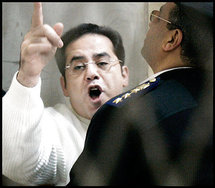
Ayman Nour
Still, the event at a Cairo hotel, aired live on television, was the closest Egypt had ever come to seeing an intellectual contest between men -- the one woman candidate, Boithana Kamel, did not attend -- who want to rule the country.
The military, which has ruled Egypt since a popular revolt overthrew president Hosni Mubarak in February, has not yet determined a date for the presidential election. A parliamentary poll is scheduled for September.
First was Ayman Nur's turn, a former parliamentarian who challenged Mubarak in a 2005 election and shortly afterwards found himself in jail after a controversial forgery trial.
This time around, the talkative liberal's biggest challenge was to cram in his answers before an attendant chimed a bell to signal that his time was up.
After such interruptions Nur would reach into a stack of party booklets that he had brought along and present one to the moderator, saying it contained the complete answer.
Next was Hamdeen Sabahi, a leftist gadfly parliamentarian who promised that he would stop exporting gas to Israel if elected president.
He was followed by a former military chief of staff, Maged Hatata, who gave terse responses -- a military habit, he explained -- and then came reformist judge Hisham Bastawisi.
The two most prominent candidates, Arab League chief Amr Mussa and the Islamist Abdel Moneim Abol Fotouh, did not take part.
All the candidates said they opposed a theocratic state and favoured a mixture of presidential and parliamentary democratic systems.
"At home, I am a Muslim or a Coptic (Christian)," said Lieutenant General Hatata, who was chief of staff between 1995 and 2001. "But on the street, I am an Egyptian."
"The religious state ended with the Prophet Mohammed's death," he said.
The candidates all agreed that they would revisit a 1979 peace treaty with Israel while improving relations with Iran.
Nur, once a US congressional darling whose cause was taken up by former president George W Bush, said: "We will not be a party in the Israel and US trench."
The peace treaty's terms with Israel would have to be revisited to allow Egypt more troops in the Sinai Peninsula, he said. The other candidates agreed.
"No one that will come by popular will would play the humiliating role adopted by the former regime," said Sabahi.
-------------------------------------------------------------------------------
The military, which has ruled Egypt since a popular revolt overthrew president Hosni Mubarak in February, has not yet determined a date for the presidential election. A parliamentary poll is scheduled for September.
First was Ayman Nur's turn, a former parliamentarian who challenged Mubarak in a 2005 election and shortly afterwards found himself in jail after a controversial forgery trial.
This time around, the talkative liberal's biggest challenge was to cram in his answers before an attendant chimed a bell to signal that his time was up.
After such interruptions Nur would reach into a stack of party booklets that he had brought along and present one to the moderator, saying it contained the complete answer.
Next was Hamdeen Sabahi, a leftist gadfly parliamentarian who promised that he would stop exporting gas to Israel if elected president.
He was followed by a former military chief of staff, Maged Hatata, who gave terse responses -- a military habit, he explained -- and then came reformist judge Hisham Bastawisi.
The two most prominent candidates, Arab League chief Amr Mussa and the Islamist Abdel Moneim Abol Fotouh, did not take part.
All the candidates said they opposed a theocratic state and favoured a mixture of presidential and parliamentary democratic systems.
"At home, I am a Muslim or a Coptic (Christian)," said Lieutenant General Hatata, who was chief of staff between 1995 and 2001. "But on the street, I am an Egyptian."
"The religious state ended with the Prophet Mohammed's death," he said.
The candidates all agreed that they would revisit a 1979 peace treaty with Israel while improving relations with Iran.
Nur, once a US congressional darling whose cause was taken up by former president George W Bush, said: "We will not be a party in the Israel and US trench."
The peace treaty's terms with Israel would have to be revisited to allow Egypt more troops in the Sinai Peninsula, he said. The other candidates agreed.
"No one that will come by popular will would play the humiliating role adopted by the former regime," said Sabahi.
-------------------------------------------------------------------------------









 Home
Home Politics
Politics









